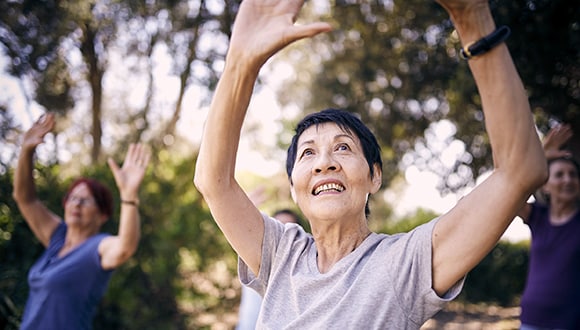Group fitness gains: the benefits of working out with friends
Hitting your exercise goals can be tough when you go it alone but research shows buddying up could bring big benefits.
Group fitness can have great rewards, from increased motivation to social interaction. In fact there’s a number of benefits that come from bonding with the people you’re working out with.
A review published in the International Review of Sport and Exercise Psychology, for example, found that exercising in a group with a focus on interaction was better than exercising in a standard exercise class or at home with help from a health professional. The results measured included adherence (sticking with it), social interaction, quality of life and fitness. Although the study looked at exercise classes, the benefits may also apply to team sports where there’s a focus on inter-personal connection.

The benefits of group fitness
Improved motivation: the camaraderie and a team-like commitment to the others in your exercise group helps you stick with it.
The Heart Foundation has Australia’s largest free walking network, which is suitable for all fitness levels. The general manager, Kay Richards, says many find the group motivating.
“It’s easy to say, ‘I’ll give my activity a miss today’, [but] knowing there is a group of people waiting for you can provide that extra motivation needed to get out the door and stay committed to a healthy lifestyle.”
Increased effort: Physiotherapist Marney Jury says that people tend to work harder when they exercise in a group.
This could be a healthy sense of competition when others are performing well, or simply wanting to look good while others can see us.
For example, a US study published in the Journal of Sport & Exercise Psychology tested people doing a plank exercise alone and with a partner. They found people were significantly more persistent with the exercise when doing it with a partner.
Psychosocial benefits: developing friendships and having social interaction help to improve self-esteem and mental wellbeing. “The same outcomes have also been shown to improve the tolerance and management of chronic pain,” Jury says.
According to Richards, “many of the more than 44,000 Heart Foundation walkers report that social contact is what keeps them coming back year after year.” The Heart Foundation’s Walking 2016 evaluation report found most walkers felt that it was important to their physical, social and/or mental wellbeing.
Safety: being in a group means you're more visible and help is nearby should you need it, Richards says.
Recognition: exercise groups or sports teams may have ways of recognising achievement, which helps with motivation, notes Richards. Some offer positive feedback, certificates when you complete a course or discounts and incentives for members.
Plusses for older adults
While the benefits of being active in a group are the same at any age, they may be especially important to many older adults who’ve gone through life changes such as retirement and family moving away, Richards explains.
A 2017 study published in BMC Geriatrics, for example, found that regular group exercise helped older participants improve their overall quality of life. They experienced increased social connection and felt a sense of community through supporting each other.
Getting your group on
Richards advises choosing a group that meets your needs then trying it out to see if you like its dynamic.
You might be able to find group activities through gyms or local community colleges. Or if you see a group training outside near you, ask the coach or a participant how you can get involved.
Just Play has a directory of team sports like cricket and volleyball in Sydney, Brisbane, Perth and Adelaide. If you need something more flexible, you could join a Meetup group or ask your friends to get together regularly for a game of football or a hike.
Sophia Auld
March 2019
Related articles
EXERCISE DOS AND DON’TS
Stay motivated and reduce your risk of injury with these tips from an exercise physiologist.
MYTHBUSTING: 6 FITNESS CLAIMS PUT TO THE TEST
We examine common claims about exercise to sort the fact from the fiction.
WHY MIXING UP EXERCISE IS GOOD FOR YOU
Trying a new workout could help you stick to your fitness goals.
7 REASONS YOU SHOULD EXERCISE (THAT HAVE NOTHING TO DO WITH FITNESS)
Exercise doesn’t just keep you trim, it enhances your wellbeing from head to toe. Here’s how.